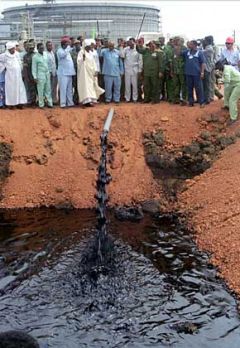Abyei ruling doesn’t demarcate North-South Sudan border – lawmaker
By Ngor Arol Garang
July 25, 2009 (ABYEI) – A leading member of the Sudan People’s Liberation Movement (SPLM) and member of South Sudan parliament said the arbitration ruling on Abyei dispute does not demarcate north –south border but only determined the land of the nine chiefdoms of the Dinka Ngok in 1095.

The dominant National Congress Party said it would stop remitting payments to the South on the oil revenue from the Heglig oil fields as the court ruling on the borders on the Abyei region stated it is part of Southern Kordofan state in the north.
“The award has nothing to do with border demarcation to cut off Panthou/Heglig from Unity State to Southern Kordofan as it is being circulated in the media,” said MP Benjamin Majak whose home village is Panthou/ Heglig.
“What happened in this case is that Panthou/ Heglig was left out of Abyei boundary, and this does not mean the court has given the oil rich area out to the north,” he underlined.
Honorable Majak who represents Ruweng constituency at the Southern Sudan Legislative Assembly went on to say that some circles misunderstood the award and said the court allotted the ownership of Panthou/Heglig oil fields to the North.
Speaking by phone from Juba on Saturday, he further said the misplaced understanding of the Award clearly overlooked the mandate of The Hague court.
The Permanent Court of Arbitration (PCA) was not demarcating the boundaries between the South and the North to determine the ownership of the disputed oil field at Panthou, the court was only trying to identify and define the boundaries of the nine chiefdoms of the Ngok Dinka, he said.
The tribunal of arbitration articulated its mandate as pertaining to: “Whether or not the ABC (Abyei Boundary Commission) Experts had, on the basis of the agreement of the Parties as per the CPA, exceeded their mandate which is ‘to define and demarcate the area of the nine Ngok Dinka chiefdoms transferred to Kordofan in 1905’ as stated in the Abyei Protocol.”
The lawmaker further said that the history of Panthou Heglig oil field is still fresh in the memory of all living Sudanese. “It is not old history like that of Abyei,” he stated. The legislator stressed that recently Sudanese government forcefully evicted residents of Panthou after the discovery of oil in the area prompting to name it as Heglig.
“The name Heglig was coined and forced on to the national map in 1999 as a lead up to the planned annexation of this area to the North.”
Majak also called to speed up the north –south border demarcation to end controversy over the issue.
(ST)
